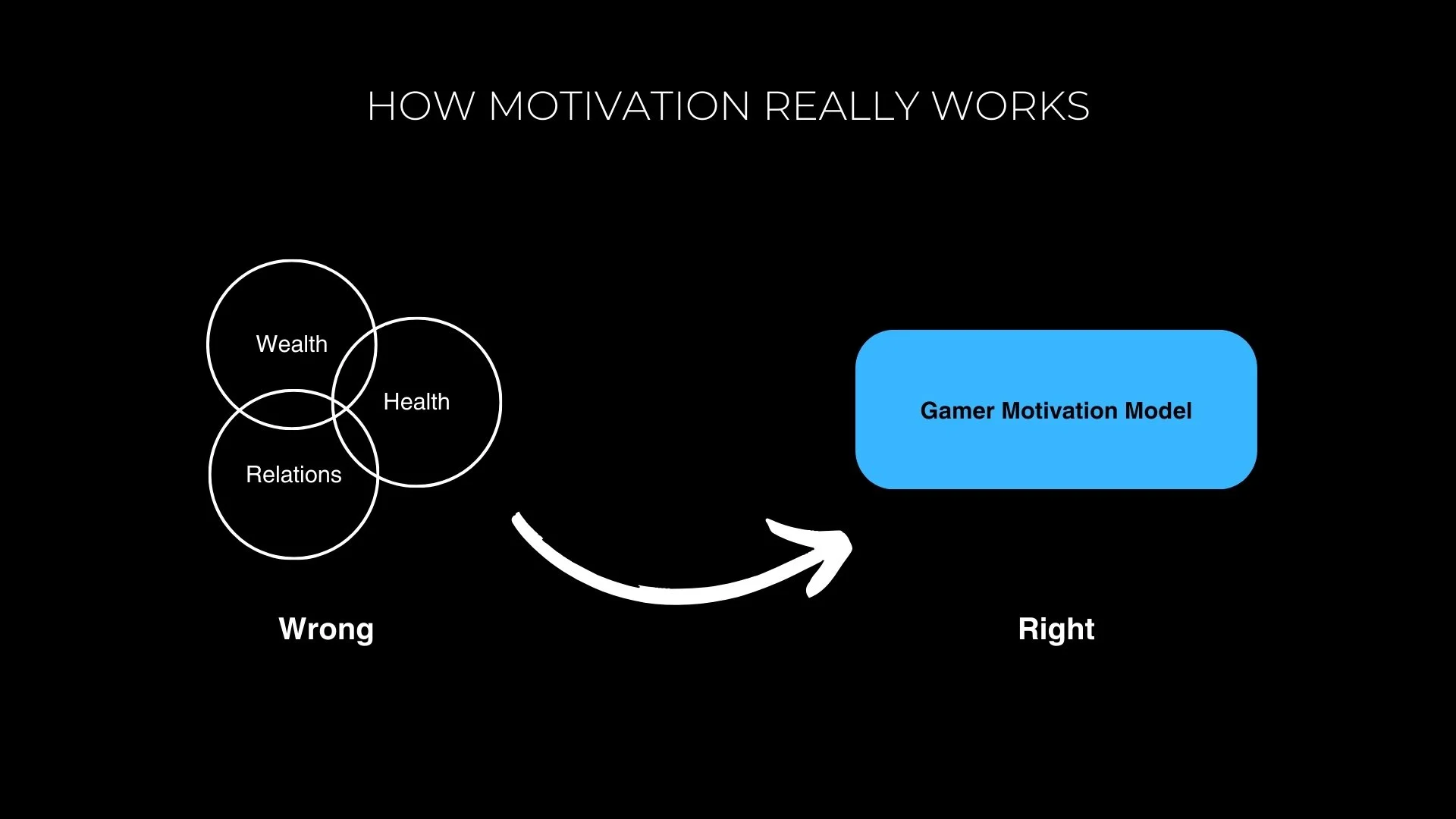Everything You Learned About Motivation Is Wrong
Read Time: 3 min
How to motivate yourself and your team.
Use this motivation model instead of the outdated models you learned.
This will help you to even motivate Gen Z workers.
The way we're taught motivation works is wrong.
The models we learned and use today are outdated and ineffective.
I know how motivation really works because I'm a game designer.
I will show you today how to really motivate your team.
Why is motivation so important right now?
Society has changed over the past 50 years, and managers haven't gotten the memo.
What worked for the Boomer employees doesn't work for Gen Z workers.
I hear CEOs complaining over and over again about the skilled labour shortage.
There is no skilled labour shortage!
The methods these top managers use to motivate their employees stopped working.
There are no lazy people, only poorly motivated people.
Alex Hormozi says that people are motivated by one of three things in every situation:
Wealth
Health
or Relationships
McClelland's Human Motivation Theory says every person is motivated by one of three factors:
Achievement
Affiliation
or Power
A 2024 survey from FlexJobs shows that these models are lacking essential motivators.
Both models somewhat work in a purely capitalist and North American market.
They're far less applicable in Europe, Asia, or Africa, especially among younger generations.
The survey showed that half of the participants would take a significant pay cut to work remotely.
The majority of this half are Gen Zs and Millenials.
Motivation works differently today than 50 years ago.
Money is not the primary motivator for today's and tomorrow's workforce.
Well-being, freedom, and purpose are the primary motivators for Gen Z.
What are you promising your team members in exchange for their time?
Is Gamification the Silver Bullet to Solve the Motivation Problem?
Actionable Gamification by Yu-kai Chou recently gained some traction in the self-improvement space.
People want to change how they work, and Chou's book became the bible for gamification in some circles.
I recently read the book and was shocked.
I saw the book 2015 when it was first released.
I was researching gamification and education methods back then.
And there is very little material on gamification that goes beyond unhealthy manipulation.
I didn't read Chou's book back then because his models were outdated already at the release date.
I gave it a try now because big influencers talked highly about it.
I was right in my assessment of the book back in 2015.
Psychology has deciphered motivation a long time ago.
We game designers learned from psychology and applied these methods for decades.
Or why do you think games are so highly engaging that people spend 1000s hours on them?
So, why are we still not using that knowledge to make work a healthier, more fun place?
Let me show you one easy-to-use model that will give you superpowers to motivate others.
The Gamer Motivation Model
The best model to date is the Gamer Motivation Model by Quantic Foundry.
This model was tested and refined with 1.65 million participants.
Drug studies only dream of such sample sizes.
The Gamer Motivation Model has something that none of the models above has.
It takes creativity and exploration into account.
Both are strong motivators that have nothing to do with money, social status, or health.
This model was designed and tested for games but can be applied to any life situation.
Especially in our work environments.
The Gamer Motivation Model identifies 6 categories of motivation:
Action - "BOOM!”
Social - "Let's play together.”
Mastery - "Let me think.”
Achievement - "I want more.”
Immersion - "Once upon a time.”
Creativity - "What if?”
Each of the six categories has two sub-categories that specify motivation more deeply.
Every person is motivated and demotivated to varying degrees by these subcategories.
I, for example, am strongly motivated by Mastery, Completion, and Discovery.
But Destruction demotivates me, and Excitement overwhelms me often.
Using this, I can create a detailed analysis of what motivates every person in my team.
And, more importantly, what demotivates them.
With this knowledge, I can get more than 2x my team's productivity.
It is often enough to remove demotivators from a workspace to change the world for your team.
Is there maybe too much competition for your team members?
Are there too many surprises?
Or are you regularly forcing your introverted devs into large group video calls?
As soon as you know your team's motivation profile, there are simple solutions to these questions.
Try it out yourself!
What are you motivated by?
What demotivates you?
Which motivation categories does your current work trigger most?
If you want read more like this every week, subscribe to my newsletter below.
WANT TO LEVEL UP YOUR BUSINESS GAME?
Read all articles one week early.
Thanks for reading to the end!
You rock!
Cheers,
Marcel




